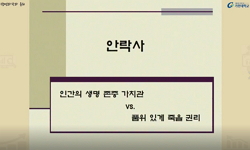The aim of this article is to analyze the current debate on human cloning within the framework of the structural value system. In particular, the ethical and religious implications of human cloning were surveyed in regards to the human genome project,...
http://chineseinput.net/에서 pinyin(병음)방식으로 중국어를 변환할 수 있습니다.
변환된 중국어를 복사하여 사용하시면 됩니다.
- 中文 을 입력하시려면 zhongwen을 입력하시고 space를누르시면됩니다.
- 北京 을 입력하시려면 beijing을 입력하시고 space를 누르시면 됩니다.
https://www.riss.kr/link?id=A101803940
- 저자
- 발행기관
- 학술지명
- 권호사항
-
발행연도
2004
-
작성언어
Korean
- 주제어
-
등재정보
KCI등재
-
자료형태
학술저널
-
수록면
181-223(43쪽)
- 제공처
-
0
상세조회 -
0
다운로드
부가정보
다국어 초록 (Multilingual Abstract)
The aim of this article is to analyze the current debate on human cloning within the framework of the structural value system. In particular, the ethical and religious implications of human cloning were surveyed in regards to the human genome project, human embryo cloning, and human cloning. Positions on human cloning technology can be divided into three broad categories. The first category includes those who embrace cloning technology, emphasizing the efficacy of that technology. The second group takes a negative position on human cloning owing to their strict and absolute view of life. There is a middle group between these two extremes, which takes a more cautious position on cloning. This group admits the usefulness of cloning technology, but insists upon the necessity of strict regulation of this technology. This article attempts to associate these three positions with structural value systems. Structural value systems have three layers: basic value targets, ultimate ends, approximate goals. What is the ultimate end of human beings? Experimentalism describes basic human need as the catalyst which makes human beings act in a certain direction. In that analysis, experimentalism explains why humans have failed to uphold their absolute obligations. In the basic value system, philosophers associate basic human needs with value. Physical needs compel humans to seek money. Intellectual needs compel them to seek power. Emotional needs compel people to seek reputation. The attempts of various individuals to meet these needs results in a conflict of desires among individuals and groups. These conflicts maybe resolved by compromise, eventually leading to fair distribution. The approximate value system defines this fair distribution as "justice." If this justice is to become genuine justice, it must attain the ultimate values of love, freedom and peace. Among these three value systems, the basic value system, seeking to fulfill basic needs such as money, power, reputation and health, will be positively associated with the position which advocates the usefulness of cloning technology. The "ultimate end" philosophers, emphasizing human dignity and the sanctity of life, and who usually pursue peace, freedom and love for humankind, will take a negative position regarding human cloning technology. Those people advocating cautious permission for cloning think that there are fair and justifiable regulations and controls which can resolve the conflict and confusion arising from freely seeking basic needs. This group can be associated with the approximate value system. Ultimate end philosophers take an unrealistic position. That is a weakness. The approximate value position can offer a realistic alternative in the pursuit of justice. In other words, in applying the ideal of ultimate love to reality, there must be some kind of compromise for justice. In the context of human cloning, cautious permission, which not only advocates ultimate value, but also recognizes the realistic need for cloning, can be defined as an approximate approach to human cloning. This approach, while warning of the dangers involved in human cloning, insists on taking responsibility for ultimate human value and considering potential damage to the ecological system. An example of the cautious permission approach toward embryo cloning experimentation which aims to utilize stem cell research would be to replace it with adult stem cell research in order to uphold the principle of ultimate ends which cherishes human dignity. Author opposes the cloning of human individuals using cloning technology due to the lack of an approximate alternative which can protect human dignity.
동일학술지(권/호) 다른 논문
-
- 한국대학선교학회
- 장윤재
- 2004
- KCI등재
-
예수 믿기 예수 살기 ; 슐라이에르마허의 나사렛 예수 이해에 관한 교회론적 고찰
- 한국대학선교학회
- 김영복
- 2004
- KCI등재
-
예수 믿기 예수 살기 ; 기독교 대학의 인간관 -숭실대학교 교수 수양회-
- 한국대학선교학회
- 이계준
- 2004
- KCI등재
-
- 한국대학선교학회
- 천사무엘
- 2004
- KCI등재





 KISS
KISS


